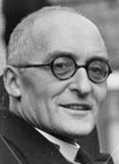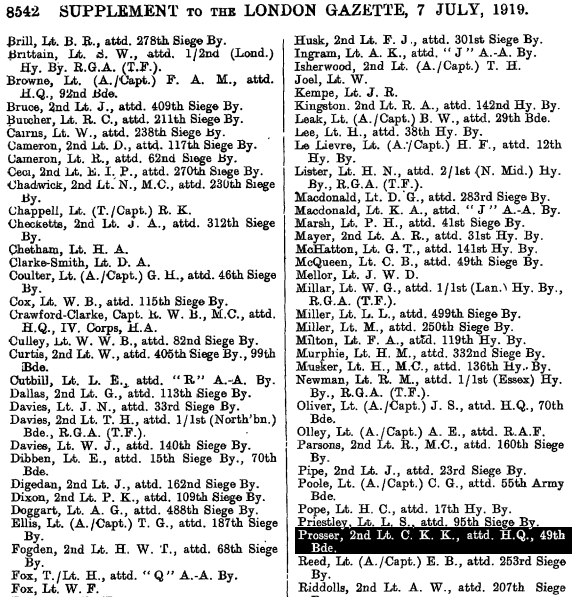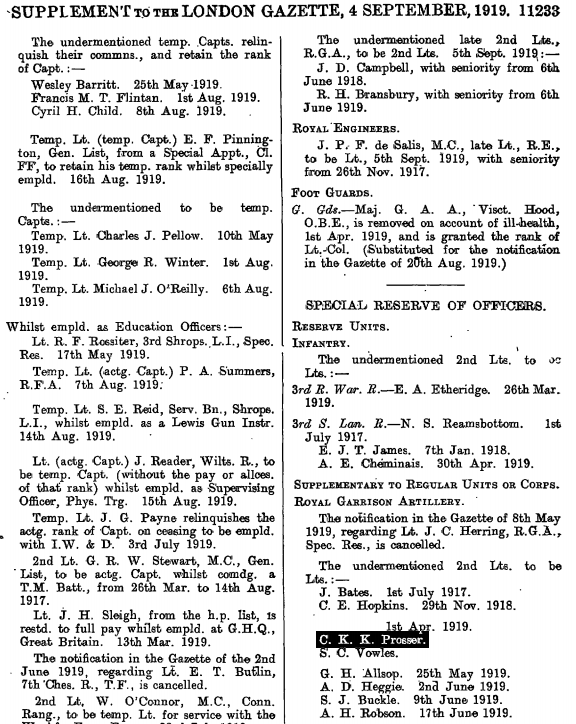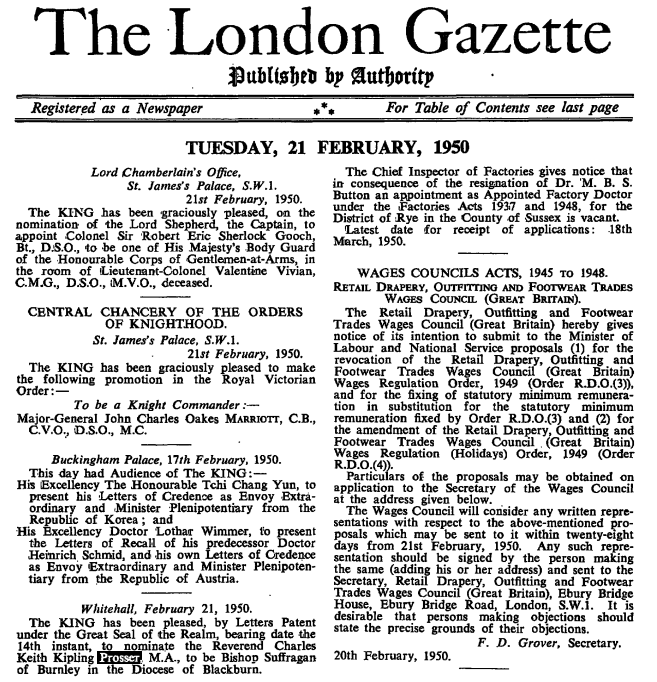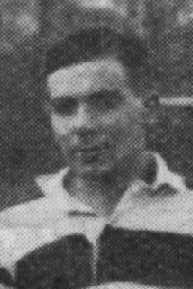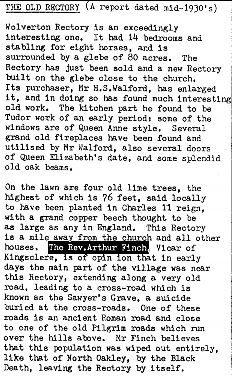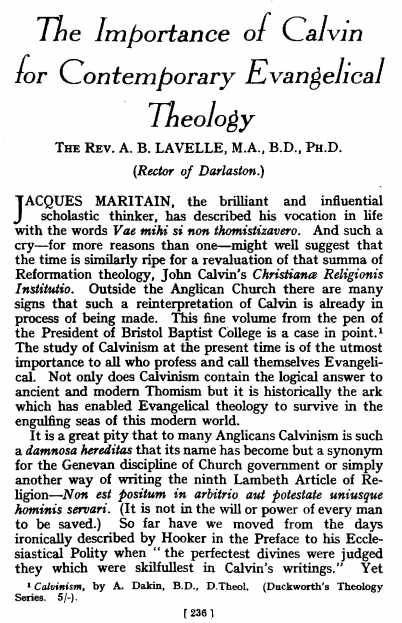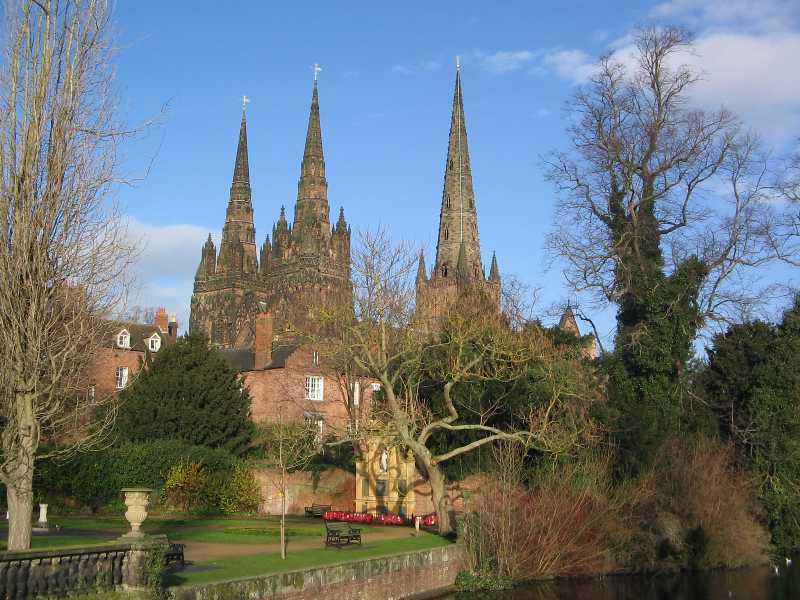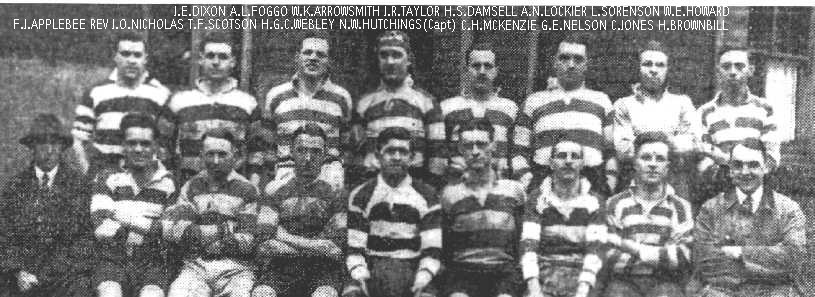Written and researched by David
Bohl,
with the kind help and documents supplied by historians
worldwide.
After
the Great War of 1914-18 the rugby
club was
graced
by another branch of gifted gentlemen.
Reverend
C.K.K. Prosser
Reverend
Charles Keith Kipling Prosser
played for Sefton in the late 1920's under the captaincy of W.E.Howard.
Born 1897 in Meriden, Warwickshire he was educated at King Edward's
School, Birmingham and served during World War
I with the Royal Garrison Artillery.
He enlisted at the beginning of 1916 and became a Cadet at the
Siege School in Aldershot in April 1917. He was discharged to
Commission on 24/11/17.
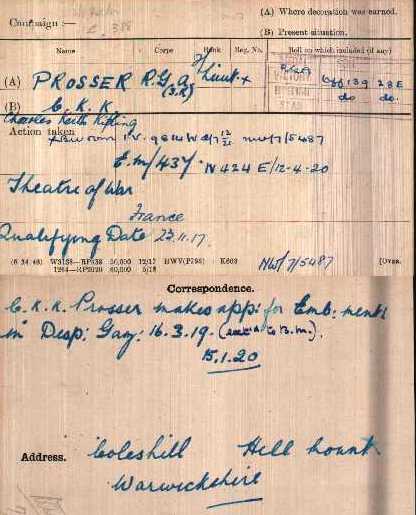
[Ancestry.com]
If
we look at the Medal
Card he is 'Mentioned in Despatches', the fourth level of bravery. By
1919 the introduction of a Certificate for a Mention in
Despatches
(MID) was to be issued and signed by the Secretary of State,
and
in 1921, an
emblem of multiple oak leaves in bronze was approved for wear on the
Victory Medal; but if that was not held the emblem could not be worn.
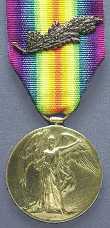 |
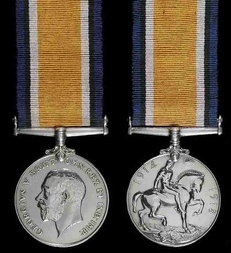
|
| Victory Medal |
British
Medal
|
Mentioned
in Despatches notification
Promoted
to Lieutenant in the RGA
After
WW1 he studied at Queens'
College, Cambridge before ordaination in 1923 and became curate of
Bishop Latimer’s Church, Birmingham.
He played several games for Sefton at first team level against the
likes of Warrington, Port Sunlight and Old Lerpooleans in the 1927 to
1929 seasons.
A passenger list picks him up travelling to Quebec in 1929, he was on
his way to take up the position of Rector of Alert Bay on the northern
tip of Vancouver Island, British Columbia.
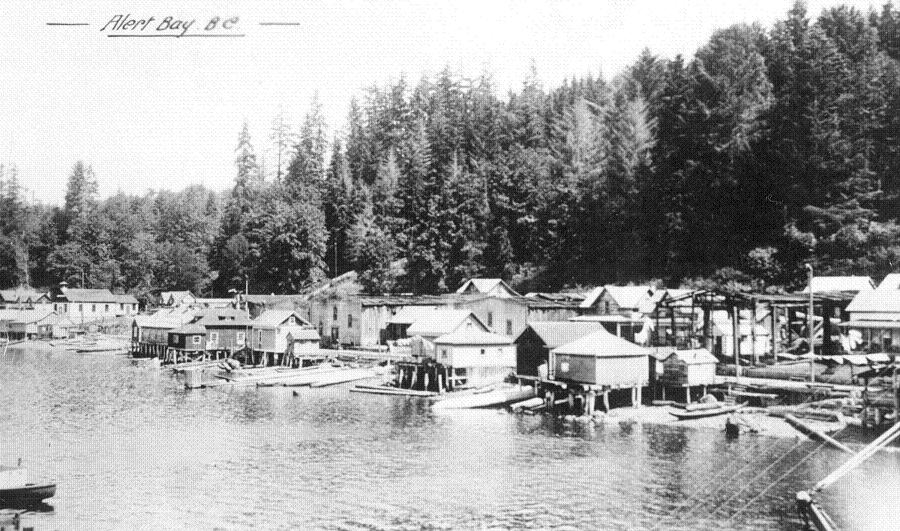
[City
of Vancouver Archives]
This
area on the Pacific coast of
Canada had a large population of native Indians and he soon
got
involved in the local laws.
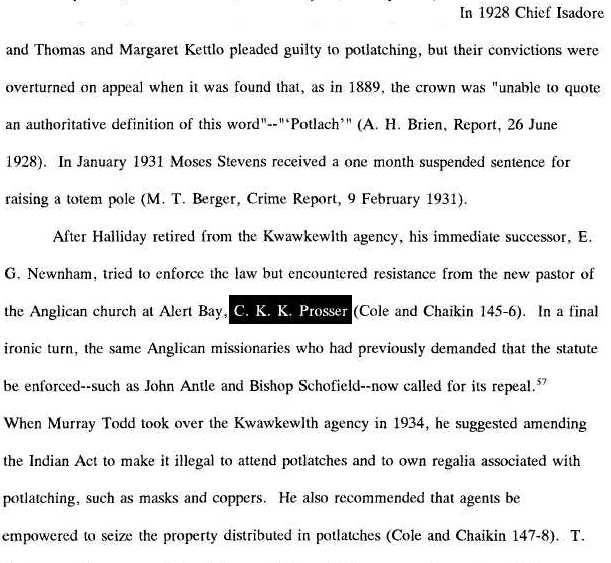
______________________________________________________________________________
The
Potlatch is also the ceremony where
a Chief will pass his rights
and privileges on to his eldest son. The word "potlatch" comes from the
Chinook jargon, a trade language formerly used along the coast.
What
is a Potlatch?
A Potlatch is not just a party. A Potlatch is a magnificent and planned
party. It's a really big deal. Planning for a potlatch might take an
entire year, or even longer! Today, as in olden times, each person
invited to a potlatch receives a present. This present can be as simple
as a pencil or as complicated as a carving. At any particular potlatch,
everyone receives the same present.
Big Event Potlatches: Indians in ancient Washington State have always
been generous people. In olden times, other tribes visited the rich
coastal Indians in the Puget Sound area hoping to trade pelts of fur
for dried seaweed for sea salt flavoring, dried fish, dried clams,
dried salmon, and dried meat. They were delighted with their greeting.
The Kitsap Peninsula and the Puget Sound area soon became the meeting
place for nearly
all of the tribes in the Pacific Northwest. Each fall, tribes from up
and down the coast would gather in the Puget Sound area to celebrate a
potlatch and prepare to trade.
A Potlatch was (and still is!) a wonderful festival with weddings and
stories (the tall tale type) and feasting and dancing and trading.
Dignity Potlatches: In olden times, potlatches were not only given only
for big events. They were given for everything. If an important person
fell off a canoe, a small but elegant and costly potlatch would be
given to offset the humiliation of the fall. You could not be laughed
at. You could not lose dignity. These were important beliefs in Native
American culture. One way to regain or to establish dignity was to host
a potlatch.
Vengeance Potlatches: There were even vengeance potlatches. If you
wanted to knock a clan down a step or two, you might try to trick them
into giving a potlatch to use up some of their wealth. People tried
very hard not to lose their temper and be tricked into giving a costly
potlatch to save face. So, if a clan had more wealth than yours, you
tried to ignore their insults. Understanding and using the potlatch
system for your own clans' advancement took great skill.
The competition to show how wealthy you were, no matter how untrue,
nearly destroyed these early people.
Fur Trade Wealth:
What saved them was the fur trade. The fur trade was introduced by the
white men. Furs were easy for these early native people to get. They
were wonderful hunters. Fur trade wealth poured into the Pacific
Northwest. The white traders also had steel tools. With the coming of
the fur trade and steel tools, many native people were able to gain the
wealth they needed to climb the social ladder of their culture.
_______________________________________________________________________
Some
carved
artefacts collected in the
region are held at the University of
Manchester Museum.
Passenger
records from July 1934 see
the Rev. Prosser returning to London aboard the freighter "Sneaton"
from Vancouver. His whereabouts during WW2 are not clear.
Rural
Dean of Leigh he was ordained to
the episcopate in
1950
Charles Keith Kipling Prosser was the fifth Bishop of Burnley from 1950
until 1954. He died in post four years later.
.
King Edwards School Chronicle – Jan 1955
Several losses fall to be recorded—two in particular. Keith
Prosser
(1916) Bishop of Burnley, who preached the Quartercentenary sermon in
the Cathedral only two years ago , died untimely, last July.
Rev.
Charles Keith Kipling Prosser
(1897-1954)
*****************************************************************************
Reverend
Arthur Finch B.A
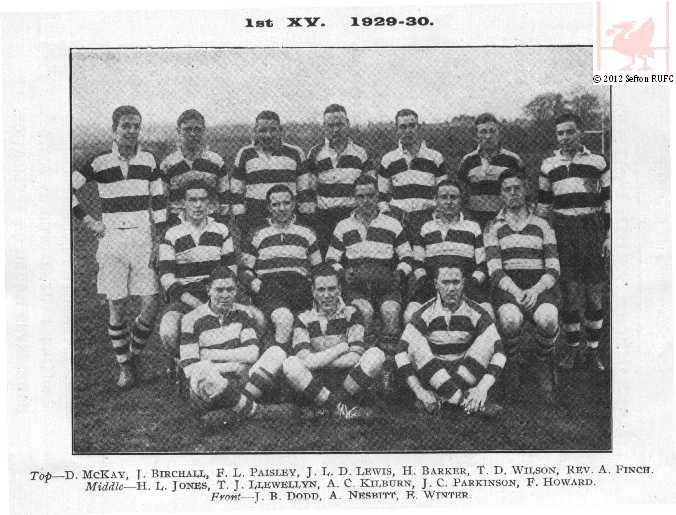
Reverend
Arthur Finch
played for Sefton in the late 1920's under the captaincy of A.C.Kilburn.
He took up a position at the Church of
St
John the
Baptist, Coventry in 1931 and according to a parish magazine was the
Rector of
St
Marys
in Kingsclere, Hampshire.
In
1940, before the Battle of Britain,
the Rev. Finch was granted a commission in the Chaplain's Branch of the
Royal Air Force Volunteer Reserve for the duration of hostilities,
with the relative rank of Squadron Leader.
THE
LONDON GAZETTE, 2 APRIL, 1940
CHAPLAINS BRANCH.
The undermentioned are granted commissions
for the duration of hostilities with the
relative rank of Squadron Leader.
12th Mar. 1940: —
The Rev. Arthur FINCH, B.A. (77970).
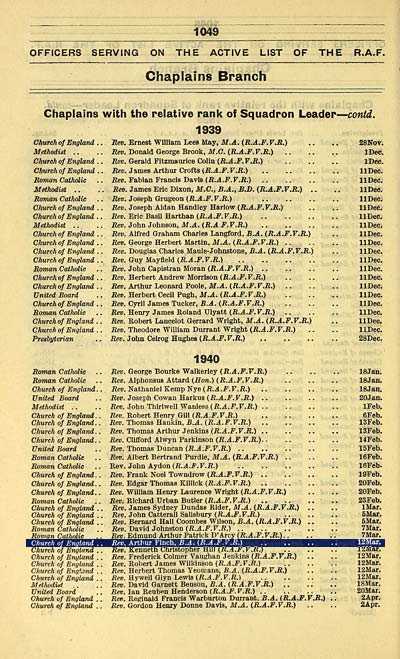
After
the war in 1948 he took over St
Marys
Church in Leigh,
Lancashire then Holy
Trinity in Matlock, Derbyshire
in 1964.
Rev. Arthur Finch B.A
*****************************************************************************
Reverend
A. B. Lavelle M.A., B.D., Ph.D.
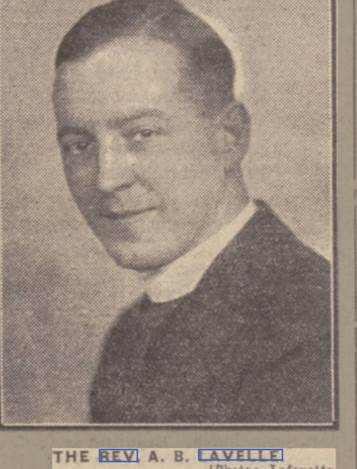
[British Newspaper Archive]
Reverend Alexander
Bannerman Lavelle played for Sefton in the mid 1920's under
the
captaincy of J.Taylor.
Born 1899 in Belfast he gained his B.A in 1919 and sat on the executive
committee of the Dublin University Student Christian Movement before
his M.A in 1922.
Many philisophical roles ensued at the Trinity College before moving to
England.
Before
WW2 he was Vicar of Kimberworth,
Rotherham and took up the position of
Rector of Darlaston in Walsall and he wrote several books and articles:-
The
local school magazine states "
Pinfold
Street School
opened its doors for
the first time on 1st
September, 1936 providing accommodation for 350 junior and infant
children. At the beginning only six classrooms were in use, and in the
early years the school playground was divided into two halves by steel
railings, the rear half for the junior boys, and the front part for the
infants and junior girls.
On
the first day 208 children were
admitted, 175 of whom, came from
Dorsett Road School. They were welcomed in the hall by Councillor F.W.
Wesson on behalf of the school management team, and Dr.
A.B. Lavelle,
the Rector of Darlaston."
http://www.historywebsite.co.uk/articles/DarlastonSchool/NewSchool.htm
"
In
1937 Darlaston celebrated the coronation with a procession through
the town centre, followed by a service at the football ground.
The
service was conducted by the Rev.
L. Robinson, representing
Methodist churches, the Rev. T. Chadwick, vicar of All Saints' Church,
Councillor W. G. Berry, chairman of the council, and the Rev.
A. B.
Lavelle, the Rector."
http://www.historywebsite.co.uk/articles/Darlaston/interwar.htm
He
became Canon Residentiary and
Precentor of Lichfield Cathedral in 1959.
Rev.
Lavelle passed away in 1964 at
Good Hope Hospital, Sutton Coldfield
Rev.
Alexander Bannerman Lavelle M.A.,
B.D.,
PH.D
*****************************************************************************
Reverend
John Owen Nicholas
Reverend
John Owen Nicholas was born 1898 in
Cinderford,
Gloucestershire and played
for Sefton in the mid 1920's under the captaincy of N.W.Hutchings.
After being
Curate at St James' Church in Gloucester he became involved in the Church
Missionary Society and he departed
Liverpool in October 1925
aboard the ship 'California' for Bombay.
During WW2 he left St
Peters Vicarage,
Birkenhead in March 1942 aboard the ship 'City of Hong Kong' for
more missionary work in the United Provinces, India..
By the late 1940's
newspaper articles
have him at Writtle
Church in Essex where he is
described as a straight talking, hard
hitting Vicar :-
- He asked for people to
give up smoking
for a fund to repair the church roof which was being damaged by the
death watch beetle.
-
Bishops Would Put TV in
Churches For
Coronation LONDON Wl—
Two
Church of England bishops proposed today that television sets be
installed in churches throughout the country next June 2 so
church-goers can watch the coronation of Queen Elizabeth II. "The idea
may be particularly helpful in country areas," Dr. Falkner Allison,
bishop of Chelmsford, wrote in a diocesan letter. Bishop Christopher
Chavasse of Rochester seconded the suggestion and declared: "The
coronation is a religious ceremony. What place could be better than a
church to see it?" Rev.
J. O. Nicholas, a country
vicar in Bishop
Allison's diocese, already is arranging to hire three TV sets for his
13th century Norman church at Writtle in Essex.
-
"SATURDAY REPLACES SUNDAY
"
CHELMSFORD. Essex, England.
Dec. 27. Saturday has replaced
Sunday as the day of the week dedicated to
religion in Britain, says Rev.
J. O. Nicholas.
But that religion is
sport, not Christianity. Mr. Nicholas, vicar oi Writtle, near here,
gave these two "new commandments" ln his parish magazine: "Remember
Saturday to keep it free, for that day Is the sabbath of sport, thy
"god. "Thou shalt .not take the affairs of sport thy god lightly, for
thou shalt lose thy (soccer) pool forecasts If thou dealest with sport
lightly." ... The vicar adds: "This precious Saturday
dedicated to
the new god is being observed far more obediently than our Sunday."
never been more disappointed in men than in these last four years
"Romance has disappeared. Although I have more clients than ever
before, at least 90 per cent of the men wanting to get married look
first of all for a prospective bride who has a well-furnished fiat, or
money, or is in a position to offer a promising business
career.
Reverend
Nicholas of Little Sampford
Rectory, Saffron
Walden, Essex passed away at
Addenbrookes Hospital, Cambridge in 1963.
Rev. J.O.Nicholas
(1898-1963)
*****************************************************************************
Reverend
F.J.McBride M.A
Reverend Fergus James
McBride was born 1899 in
Lancaster and played
for Sefton in the mid 1920's under the captaincy of S.G.Bacon.
He was educated at
Queens's College,
Oxford gaining an M.A.
Passenger
records from February 1934 trace him leaving Liverpool with his family
for Bombay on the ship "
Tuscania"
on
missionary work.
This was probably with the
Church
Missionary Society, similar to
work of the aforementioned Sefton
player Rev. J.O.Nicholas.
He
published a book in 1940 entitled "Sikandra
1840-1940",
Sikandra being
the mausoleum of the great Moghul Emporer Akbah.
Subsequent
records see him arriving
back at Southampton from Bombay in August 1945 on the "SS Empire Trooper",
he was
living in Withington, Manchester.
By
1950 he was vicar of
St James
Church in
Haslingden, near Burnley in Lancashire.
The
following article appeared in the
Haslingden Observer regarding Stonefold War Memorial on 7th April
1951 :-
"Their
Names Will Live"
"The
Rev. F. J. McBride on Sunday
dedicated a marble tablet to the
memory of 10 men who gave their lives during the last war.
The tablet
was unveiled by Councillor J. Illingworth, a member of the Parochial
Church
Council."
Rev.
McBride retired to run a home for
retired clergy in South East London and passed away in 1980
Rev. Fergus
James.McBride M.A
(1899-1980)
